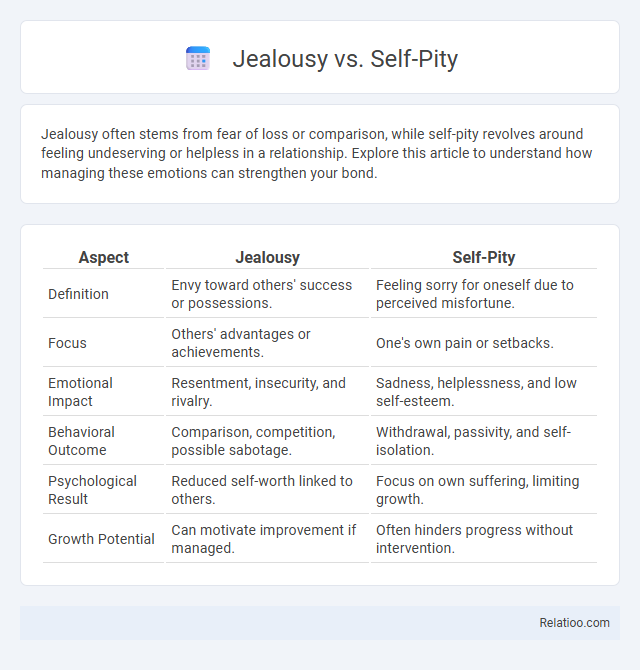Jealousy often stems from fear of loss or comparison, while self-pity revolves around feeling undeserving or helpless in a relationship. Explore this article to understand how managing these emotions can strengthen your bond.
Table of Comparison
| Aspect | Jealousy | Self-Pity |
|---|---|---|
| Definition | Envy toward others' success or possessions. | Feeling sorry for oneself due to perceived misfortune. |
| Focus | Others' advantages or achievements. | One's own pain or setbacks. |
| Emotional Impact | Resentment, insecurity, and rivalry. | Sadness, helplessness, and low self-esteem. |
| Behavioral Outcome | Comparison, competition, possible sabotage. | Withdrawal, passivity, and self-isolation. |
| Psychological Result | Reduced self-worth linked to others. | Focus on own suffering, limiting growth. |
| Growth Potential | Can motivate improvement if managed. | Often hinders progress without intervention. |
Understanding Jealousy: Definition and Causes
Jealousy arises from the fear of losing something valuable to you, often triggered by perceived threats to your relationships or status. Understanding jealousy involves recognizing its roots in insecurity, low self-esteem, and comparison to others. Your ability to identify these causes can help manage and transform jealousy into personal growth.
What is Self-Pity? Core Traits and Origins
Self-pity involves an excessive focus on one's own suffering, often accompanied by feelings of helplessness and victimhood, which can erode self-esteem and hinder personal growth. This emotion originates from a combination of cognitive distortions, such as overgeneralization and personalization, and unresolved negative experiences that reinforce a sense of inadequacy. Understanding your self-pity requires recognizing these core traits and addressing underlying beliefs to foster resilience and emotional well-being.
Key Differences Between Jealousy and Self-Pity
Jealousy involves feeling threatened by someone else's success or possessions, sparking comparisons that impact your emotions and behavior. Self-pity, however, centers on feeling sorry for yourself due to perceived misfortunes or hardships, often leading to withdrawal rather than rivalry. Understanding these key differences can help you manage emotions more effectively and foster healthier relationships.
Emotional Impact: Jealousy vs. Self-Pity
Jealousy triggers intense emotional responses rooted in comparison and fear of loss, often leading to insecurity and resentment. Self-pity, by contrast, centers on feelings of helplessness and victimization, which can perpetuate a cycle of negative emotions and inhibit personal growth. Understanding your emotional impact helps determine whether jealousy drives your interactions or self-pity limits your resilience.
How Jealousy Manifests in Relationships
Jealousy in relationships manifests through possessiveness, constant suspicion, and emotional insecurity, often leading to mistrust and conflict between partners. Unlike self-pity, which centers on feelings of personal inadequacy and helplessness, jealousy specifically triggers reactive behaviors aimed at controlling or monitoring the partner's interactions. Recognizing these patterns helps distinguish jealousy from self-pity, allowing for healthier communication and emotional balance in intimate relationships.
The Consequences of Dwelling in Self-Pity
Dwelling in self-pity can lead to a cycle of negative emotions that impair your mental health and hinder personal growth. Unlike jealousy, which often motivates competition or comparison, self-pity traps you in feelings of helplessness and stagnation. Remaining stuck in this mindset can damage relationships and reduce resilience, making it difficult to overcome challenges effectively.
Breaking the Cycle: Overcoming Jealousy
Breaking the cycle of jealousy requires recognizing its roots in insecurity and shifting focus toward self-compassion rather than self-pity, which perpetuates negative emotions and stagnation. Cultivating gratitude and personal growth enhances emotional resilience, enabling individuals to reframe comparisons into motivation rather than resentment. Mindfulness practices and cognitive-behavioral techniques promote awareness and control over jealous thoughts, fostering healthier relationships and self-esteem.
Moving Past Self-Pity: Steps Towards Empowerment
Moving past self-pity involves recognizing its limiting impact on personal growth and shifting focus toward proactive self-empowerment. Key steps include cultivating self-awareness, setting achievable goals, and embracing accountability for one's emotional state. Techniques such as mindfulness, positive affirmations, and seeking support from mentors facilitate resilience and a forward-moving mindset over feelings of helplessness.
Healthy Coping Strategies for Both Emotions
Jealousy and self-pity often stem from feelings of inadequacy and comparison, impacting emotional well-being and relationships. Healthy coping strategies include practicing mindfulness to increase self-awareness, fostering gratitude to shift focus from deficits to positives, and seeking social support for perspective and reassurance. Cognitive-behavioral techniques such as reframing negative thoughts can reduce the intensity of these emotions and promote emotional resilience.
Choosing Growth: Transforming Jealousy and Self-Pity
Transforming jealousy and self-pity into personal growth requires cultivating self-awareness and emotional resilience. Recognizing jealousy as a signal of unmet desires and self-pity as a response to perceived victimhood enables individuals to redirect negative emotions into motivation for self-improvement. Choosing growth over stagnation fosters a mindset centered on empowerment, goal-setting, and positive change, ultimately enhancing emotional well-being and life satisfaction.

Infographic: Jealousy vs Self-pity
 relatioo.com
relatioo.com